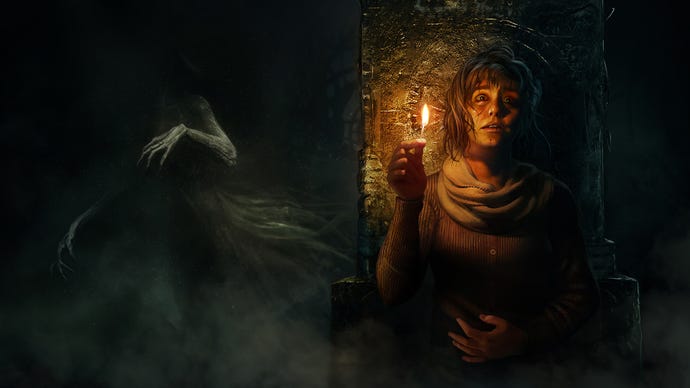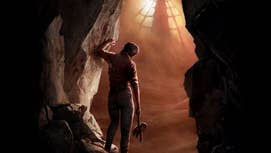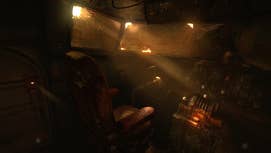Amnesia: Rebirth Review: A Different Kind of Horror
Terror and catharsis intermingle in this superb sequel to a horror classic.
This article first appeared on USgamer, a partner publication of VG247. Some content, such as this article, has been migrated to VG247 for posterity after USgamer's closure - but it has not been edited or further vetted by the VG247 team.
Jump scares have been relegated to the damnable pits of B-movie schtick, a gimmick of the horror genre that's synonymous with cheap, low-effort frights. We're all familiar with such moments: you turn around a corner in anticipation of an unimaginable terror. When you don't see one, a sense of relief sets in—only for some monstrosity to materialize right behind you, its growl dialed up to a crescendo.
Amnesia: Rebirth, the sequel to horror classic Amnesia: The Dark Descent by Frictional Games, has managed to turn this trick into a masterful sleight-of-hand, conjuring a ghoulish survival horror that gnaws at your psyche. Rebirth accomplishes this through an achingly gradual build-up to an unnerving cerebral horror, a clever ploy that renders every jump scare—which is, admittedly, not as frequent as you may expect—extremely potent, like a brief discharge of the pent-up jitters.
You'll relive all the trepidation of the survival horror experience as Tasi Trianon, an ill-fated engineer who is left stranded when the plane she's on crashes onto the sandy dunes of the blistering Algerian desert. As with the protagonists of previous Amnesia games, Tasi somehow has no recollection of the events in the aftermath of the crash, and zero knowledge behind the abrupt disappearance of her colleagues. Only through following the trail of breadcrumbs left behind by her crew, in the form of broken debris and discarded notes, can she piece together the truth behind her dreadful circumstances, and unravel the reason behind her fraught mental state.
The scares that follow are relentless. Rebirth's nightmarish spaces and Tasi's anxiety are such constant reminders of your impending danger that any discordant note or sign will swiftly shove your heart into your throat. Like being trapped in the noxious belly of a malevolent beast, the scorching Algerian desert feels actively antagonistic, a tumorous slosh of natural and body horror that threatens to digest and consume you whole. Tasi traverses down a reluctant path into unfamiliar, otherworldly territories—most of them being horrendously murky caves and darkened stretches of corridors. You'll instinctively learn to be wary and terrified of these lightless places, as when Tasi lingers too long in them, her panic will become palpable: her breathing becomes more ragged, and her vision turns blurry and crinkles with black, sinuous lines, seeping in from all corners of the screen like a poisonous miasma. At her most vulnerable, a rapid, violent succession of images even flash across the screen—a scare that never ceases to be utterly petrifying, even when you are expecting it.
Managing this mounting tension, which is chiefly about keeping Tasi's anxiety and fear at bay, is central to Rebirth. It eschews the original game's sanity meter, a discolored brain that swelled to an unsettling red when the protagonist's mental health dipped to a dangerous low. For players who are already familiar with The Dark Descent, Rebirth doesn't stray far from this familiar setup. In the vein of The Dark Descent's hero Daniel, Tasi is also no combatant, amplifying your sense of helplessness and despair. The few items she possesses are a very limited supply of matchsticks and an oil lantern, which provide a faint glimmer of light with which she uses to fend off the darkness.
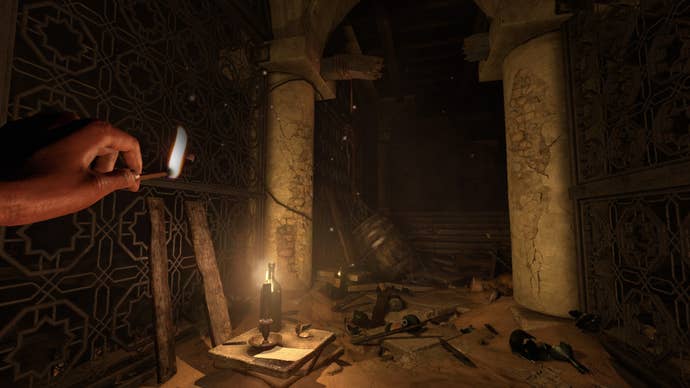
Without the means to defend herself against the dangerous denizens of the desert, most events can induce Tasi into panic attacks, be it catching sight of the wailing, misshapen monsters that hunt her, or witnessing macabre scenes of hapless victims flayed into unrecognizable fragments of muscles. At the same time, interactive puzzles are woven into Rebirth, which ratchets the tension up and offers a pervasive sense of danger, especially within the few heart-palpitating seconds that you have to escape from its lurching horrors. Imagine having to tediously shove a heavy, creaky gate as it reluctantly gives way, while a monster lets out a blood-curdling howl behind you.
To seek refuge from these barbaric displays feels antithetical to surviving these horrors; after all, how can you run away from something you're not supposed to see, or stay safe in an environment that nibbles away at your sanity? Navigating through these contradictions fuels the twists and suspense in Rebirth. This interplay between light and dark, hope and despair, salvation and damnation, has become a hallmark of the Amnesia series, and a formula that Frictional Games continue to finetune with remarkable success.
Frictional Games, however, has chosen to blend one more ingredient into its horror concoction for Rebirth: a gut-wrenching narrative on motherhood. One sign of this direction is the increased focus and volume in cutscenes, which are thankfully introduced at times that rarely splinter the pace of the horror. At its core, Rebirth is a tale that explores the unyielding strength of motherhood, a recurring theme that sees parallels even in its most grotesque monsters, as well as the lore within the Amnesia universe. It's a perspective that's woefully lacking in mainstream games, especially given the growing prevalence of stories around videogame dads in recent years—from gruff dad-god Kratos of God of War to Joel, The Last of Us's murderously protective father figure. When video game moms do make an appearance, most of them are fridged, or merely serve as plot devices to justify the male hero's motivations and anguish.
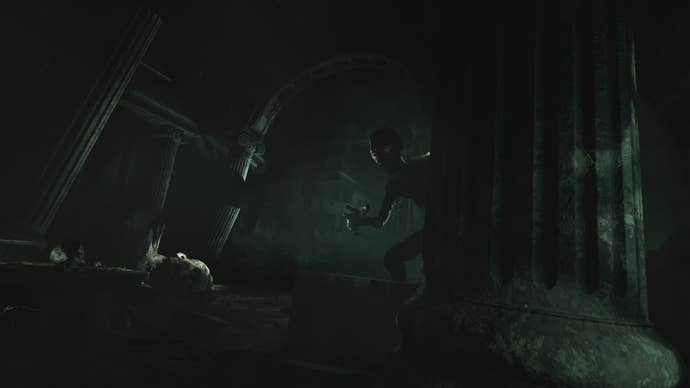
Rebirth subverts all these by foregrounding its tale around Tasi and its other maternal figures first, a decision that cements the game as an unabashedly and staunchly feminine title. One chapter from Tasi's journal—the game's means of helping players keep track of the plot—is dedicated to charting the growth of her young child Alys. A secondary storyline that is slowly unveiled alongside Tasi's personal quest to return home is centered around the mournful beginnings of an ancient, matriarchal civilization. While Rebirth is still wont to fall back on some persistent stereotypes about motherhood, it does take the time to parse the nuances of its portrayal, laying these narrative bricks as a foundation for its frights. This tension reaches its inevitable peak towards the second half of the game, where Tasi has to grapple with the suffocating realization that both her own body and mind may be turning against her.
The anatomy of Rebirth, from its sublime use of psychological and body horror, to its meaningful portrayal of motherhood—a theme that permeates throughout the game—renders it as another enduring horror classic by Frictional Games. It's one that will crawl and stay under your skin even when you're done, a natural culmination of Frictional Games' horror ambitions that began with 2010's The Dark Descent and continued with the more narrative-driven follow-up by The Chinese Room, Amnesia: A Machine For Pigs, in 2013. It ultimately doesn't stray far from its grisly formula of survival horror from The Dark Descent—one that inspired countless horror games after, and in which you are mostly powerless against its terrors—but it achieves its central goal: crafting a worthy sequel to such a pioneering title. Even players who aren't traditional horror fans—like yours truly—should be intrigued by the heartrending resonance that Rebirth offers. And this is also how Rebirth concludes: not with a series of intense jump scares or creepy vignettes, but with an emotional catharsis that will leave you reeling from its impact.
ConclusionMaking a sequel to one of the most acclaimed horror games in recent memory may be a tall order for some, but Frictional Games has done it with aplomb with Amnesia: Rebirth. Without straying far from the formula that made Amnesia: The Dark Descent so popular and feared in equal measure—the clever use of jump scares, immersive puzzles and the light-dark dichotomy—Rebirth has reinvigorated its brand of horror with a haunting narrative that’s as moving as it is refreshing. Rebirth may still be a bit too much to bear for players who don’t usually venture into horror, but it's a sequel that should please ardent fans and horror masochists alike.
